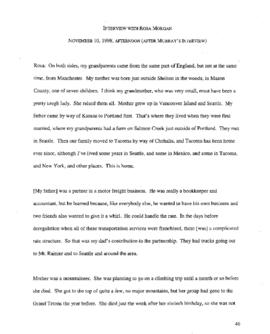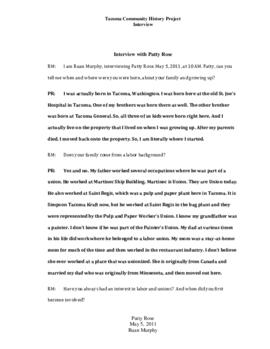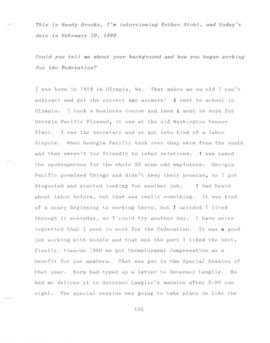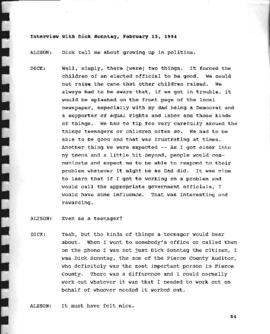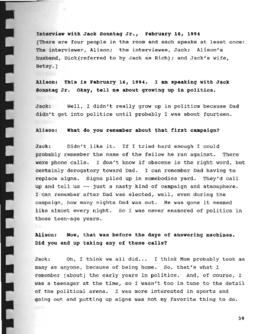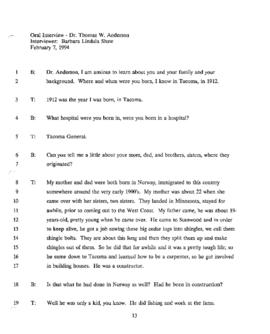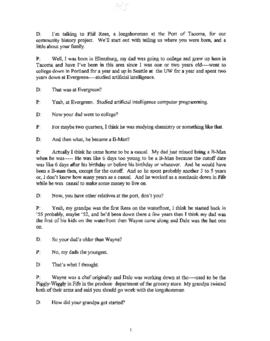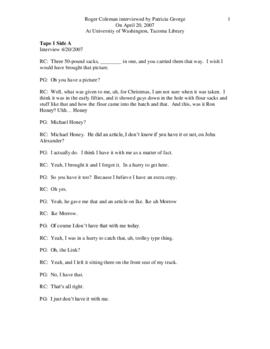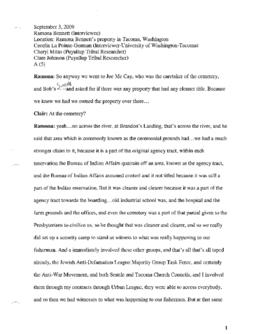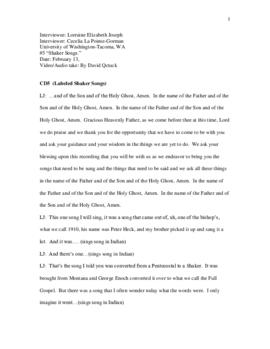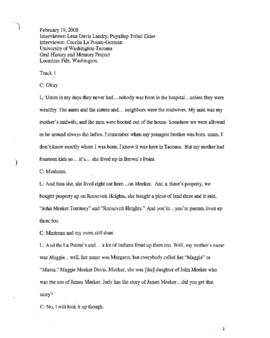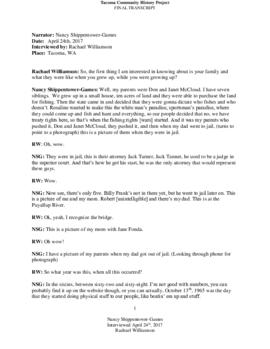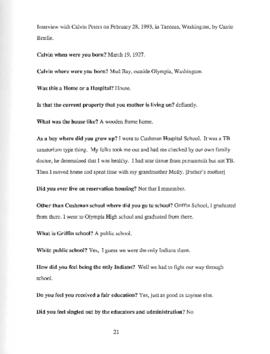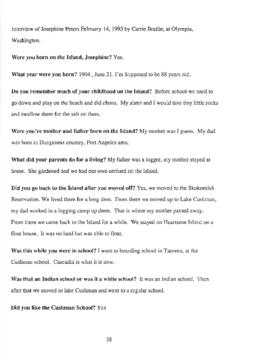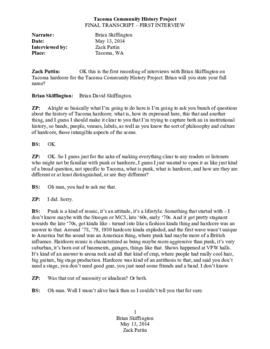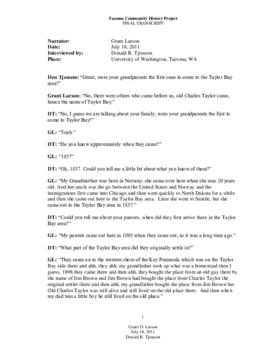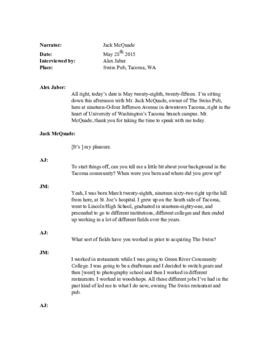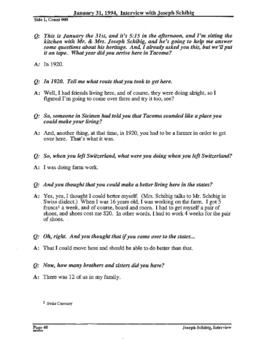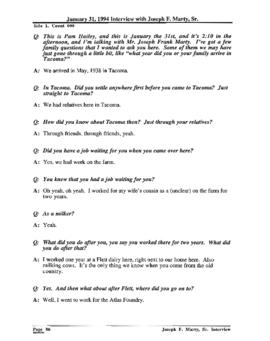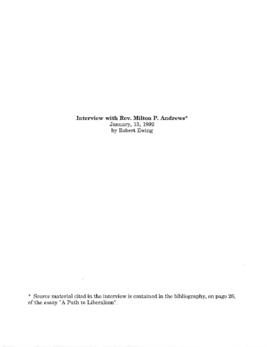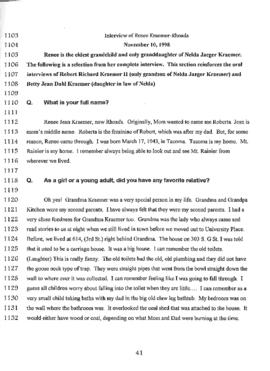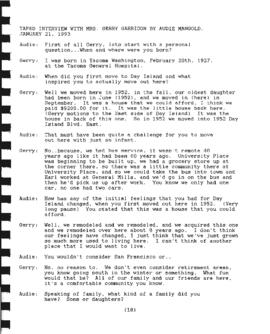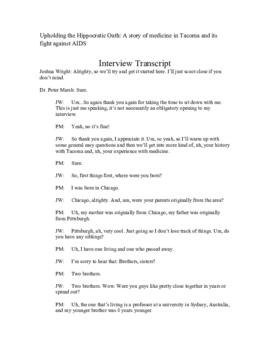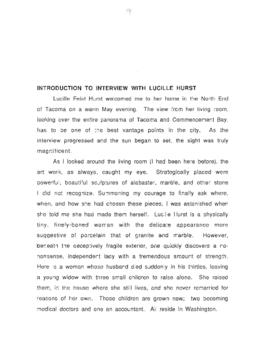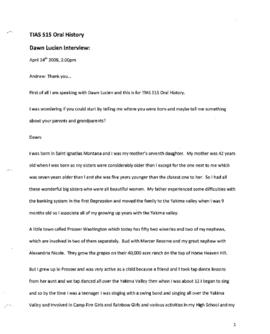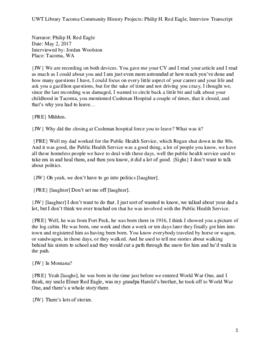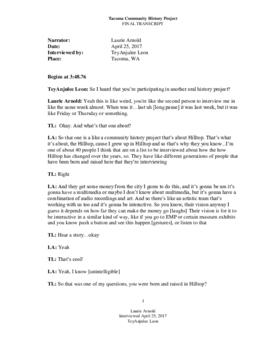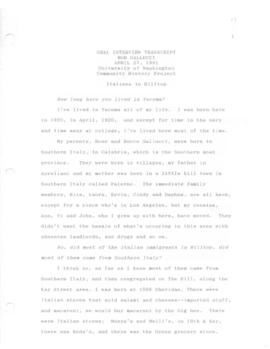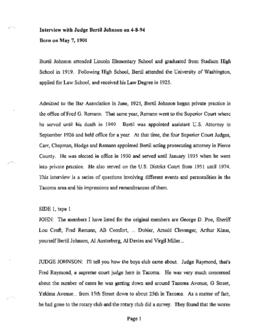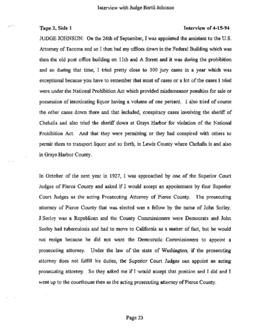Showing 153 results
CollectionsPatty Rose, Pierce County Central Labor Council
- Item
- 2011
Oral history interview with Patty Rose by Ruan Murphy conducted 05/05/2011. Patty Rose gives an overview of her nearly four decades of involvement with the Tacoma labor movement and discusses her current position as secretary-treasurer for the Pierce County Central Labor Council. She describes the PCCLCs role as an umbrella organization and talks about the specific political and educational resources that are gathered on behalf of members. She also comments on some of the pressing issues currently faced by labor unions and American workers in general, including outsourcing, rising healthcare costs, and loss of pension benefits.
A concrete look at our community
- Item
- 1994
Oral history interview with Thomas W. Anderson by Barbara Lindula Shaw conducted 02/07/1994. Dr. Thomas W. Anderson, co-founder of Concrete Technology Corporation (CTC), shares his personal history and gives an economic and historical overview of CTC, the first prestressed concrete manufacturing plant in the U.S. He discusses CTC's pioneering role in the prestressed concrete industry, its major milestones, and its philosophy of corporate responsibility.
Still Fighting after All These Years: A Puyallup Tribal Member's Perspective
- Item
- 2017
Oral history interview with Nancy Shippentower-Games by Rachael Williamson conducted 04/24/2017. Nancy Shippentower-Games is a member of the Puyallup Tribe in Washington State. Nancy's parents are Donald and Janet McCloud. She has seven siblings and grew up on the banks of the Nisqually River and Puyallup Rivers and currently resides in Yelm, Washington. Nancy grew up during the fishing wars that took place on both the Nisqually and Puyallup Rivers. Her mother Janet McCloud and her uncle, Billy Frank Jr., were very active advocates during the battle over salmon. She remembers vividly the violence, racism and injustices that she and her people suffered as they fought for what was rightfully theirs. By revisiting the circumstances and propositions set forth in the Medicine Creek Treaty of 1854, a better understanding of what the Puyallup and Nisqually tribes have been fighting for comes into focus. While the Boldt Decision of 1974 was a turning point for Northwest Tribes, concerns such as climate change, overpopulation, and proposals such as the LNG plant in Tacoma continue to put the salmon runs at risk.
- Item
- 2015
Oral history interview with Jack McQuade by Alex Jaber conducted 05/28/2015. This project is comprised of an oral interview, recorded and transcribed, with Mr. Jack McQuade, co-owner of The Swiss pub, located at 1904 Jefferson Avenue, Tacoma, WA. The research paper investigates the factors involved when Mr. McQuade started this business during the early 1990's, as well as, examining how this helped revitalize and preserve the south downtown Tacoma setting on the UW Tacoma campus. The Swiss is a first-rate location for inspection due to its existence for over 100 years. Mr. McQuade has been the owner for as long as UW's 46 acre downtown campus has been in existence, his insight provides invaluable perspective on the transition over last 25 years of both the campus and his business in relation to one another.
Hillside Community Church: A Path to Liberalism
- Item
- 1992
Oral history interview with Milton P. Andrews by Robert Ewing conducted 1/13/1992. Andrews discusses his experiences growing up as the son of a fundamental (Free Methodist Church) preacher in Missouri, his education, religious training, and his own spiritual and philosophical shift to a more progressive brand of religion and into activism for social justice. Andrews details his controversial tenure as the leader of several churches in Ohio, New York and Washington State, including Epworth Lesourd Methodist Church in Tacoma, where his stance against the Vietnam War led to his forced resignation in 1970. The interview only briefly touches on Andrews's involvement with the Hillside Community Church.
A Woman of Firsts: Nelda Jaeger-Kraemer - Her Life as a Citizen of Tacoma for Ninety-two Years
- Item
- 1998
Oral history interviews with Robert Richard Kraemer, Jr; Betty Kraemer; and Renee Kraemer-Rhoads by Kathryn S. Held conducted 11/1998. Robert Richard Kraemer Jr, Betty Dahl Kraemer, and Renee Kraemer-Rhoads present their family history and share stories about the several generations of Kraemers, Jaegers, and Kitchens who have lived in the Tacoma area. Particular focus is given to Nelda Jaeger-Kraemer, one of the first women to graduate from the University of Washington Law School.
Upholding the Hippocratic Oath: A Story of Medicine in Tacoma and its Fight Against AIDS
- Item
- 2015
Oral history interview with Peter Marsh by Joshua Wright conducted 05/28/2015. From the very beginning, Tacoma was met with illness in the form of typhoid. Disease would continue to wage war against the residents of the City of Destiny until the Fannie C. Paddock Memorial Hospital and St. Joseph Hospital were built in 1882 and 1891, respectively. Both organizations developed meaningful relationships with their community and ignited a behind-the-scenes competition which would benefit both patient and physician. Almost 100 years later, Tacoma was cared for predominantly by primary care physicians. It had just started to see an influx of medical specialists via Madigan Army Medical Center when the city was hit by HIV in 1983. With no effective cure at the time, Tacoma did its best to cope with the disease and its associated complications, and the infectious disease specialists were on the forefront. One of these few physicians was Dr. Peter Marsh. Born in Chicago in 1949, he was inspired to become a doctor as a young boy by the Dr. Kildare film series. Arriving in Tacoma in 1981, he would find himself in the middle of handling the AIDS epidemic, supporting patients as best as he could before they succumbed to the disease; that is, until the introduction of antiretroviral medications. Now able to effectively cure patients, Dr. Marsh found new life in his work and continued to serve his community until retirement in 2015. With the epidemic under control, Tacoma still utilizes what it learned from that chaotic era to stand prepared for anything thrown its way.
- Item
- 2017
Oral history interview with Philip H. Red Eagle by Jordan Woolston conducted 05/02/2017. Philip H. Red Eagle was born in 1945 in Tacoma, Washington. His mother, Marian Steilacoom, of Salish decent, was born near Port Angeles, Washington. Philip's father, Philip Red Eagle, a member of the Dakota Tribe, was born near the Missouri River on the Fort Peck Indian Reservation in Montana. Phillip spent the first fourteen years of his life in Tacoma, attending Stanley and McCarver schools before moving to Sitka, Alaska with his family in 1959. Philip joined the Navy shortly after graduating from high school, serving in Vietnam for five years from 1969-1973. After Vietnam, Philip returned to Washington and began undergraduate studies at the University of Washington where he earned two bachelor's degrees. The return to civilian life after the war affected Philip and he struggled with PTSD and related issues like depression and insomnia. Philip found that art, writing, and taking part in the revival of his culture helped him confront his PTSD and over the last 30 years Philip has contributed greatly to the revival and expansion of Indigenous culture in the Pacific Northwest.
Perspectives on Tacoma School Desegregation: From Wallflower to Rabble Rouser
- Item
- 2017
Oral history interview with Laurie Arnold by TeyAnjulee Leon conducted on 04/25/2017. The child of left leaning social activists, Laurie Arnold grew up during a time of great change in the country and the Tacoma community. The same year Laurie started first grade, McCarver Elementary in Tacoma became the first magnet school in the country and began the desegregation process of Tacoma Public Schools. Though Laurie only attended through fifth grade, her experiences there lasted a lifetime. Throughout her educational journey, Laurie attended many schools, and the one that remained clearest in her memory was McCarver. One of her fondest memories was Friday Activities, and she could still recall the teachers she had as well which teams she belonged to. Laurie lived in Hilltop most of her childhood and only spent about seven or eight years away before returning home to Tacoma for good. In that time, she lived and attended schools in Seattle until age fourteen. Roughly a month into her ninth grade year, Laurie dropped out of school and moved to Florida until age seventeen. Upon her return, Laurie completed her GED, Associates, Bachelors, and Masters degrees all in the South Puget Sound region. She taught at the Tacoma Urban League for many years before she found her way to Bates Technical College where she currently works. Laurie continues to serve the Tacoma community and is a proud Hilltop native.
- Item
- 1991
Oral history interview with Bob Gallucci by Dian Hathaway conducted April-June 1991. The collection contains two interviews with Bob Gallucci, in which he discusses his experiences growing up as a second generation Italian American within a first generation immigrant extended family household in the Hilltop neighborhood of Tacoma, Washington during the pre- and post World War II years. Gallucci describes the attitudes of his immigrant parents, what life in Hilltop was like during the early and mid twentieth century, the current (1990s) problems of Hilltop, and his reasons for becoming active in issues relating to peace and social justice.
